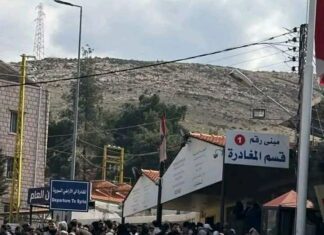
An earthquake measuring 7.8 on the Richter scale struck Turkey’s southwest on February 6th, early Monday morning, centered on Gaziantep city, the massive quake caused destruction throughout southern Turkey and northern Syria, leading to a humanitarian catastrophe destroying hundreds of buildings and resulting in thousands of civilian casualties throughout the region.
During the first hours, dozens of residential buildings collapsed in several Syrian governorates, including Idlib, Aleppo, Latakia, and Raqqa, leaving thousands stranded under the rubble. Initial rescues were impeded by a massive 7.5 aftershock which caused additional damage and chaos, less than 10 hours after the first quake. Aftershocks of varying degrees continue to be felt across northern Syria and Southern Turkey as teams on both sides of the border scramble to save those still buried beneath the rubble.
The Syria Civil Defense (SCD) teams, the White Helmets, have declared a state of emergency, racing to rescue those entombed beneath rubble throughout the area, and advised occupants to vacate residential buildings, go to open places, and inform the defense teams of those who remain trapped. The teams have said, “The number of completely collapsed buildings increased to over 400 with more than 1,300 buildings severely destroyed.” adding that, “Thousands of other buildings remain damaged.”
According to the team: “The number of earthquake victims has risen to over 1,280 dead and more than 2,600 injured in opposition-held areas in northwestern Syria.” However, the death toll is expected to rise eventually as hundreds of families are still under the rubble for over 50 hours.
The General Security Agency (GSA) in Idlib declared full alert, and the Syrian Salvation Government (SSG) announced the formation of an emergency response committee. The Idlib Health Directorate has called upon the citizens in liberated areas to go to hospitals to donate blood.
The Ministry of Defense of the (Syrian Interim Government) also called on all military units and formations in the Syrian National Army to provide assistance to civil defense personnel and to provide the required mechanisms to rescue and aid the injured and those affected by the earthquake.
The earthquake caused great panic throughout the region, as thousands of civilians took to the streets in all the rural areas struck by the earthquake. The SSG has coordinated efforts to set up several emergency shelters throughout the region, providing food, shelter, and heating to displaced and homeless families.
While the SCD have thanked Egypt for sending a “technical team of specialists to support rescue operations” the Bab al-Hawa Border Crossing released a statement saying that they have, “not received any aid from any nation or international organization,” yet they remained, “prepared and ready to receive and facilitate the entry and distribution of any aid, whether equipment or supplies to help with search and rescue and relief.”
The devastation caused by the earthquake has caused thousands of already displaced and impoverished people to suffer further hardships after enduring over a decade of war and displacement with many families losing everything, and has resulted in one of the greatest humanitarian crises the region has seen.





